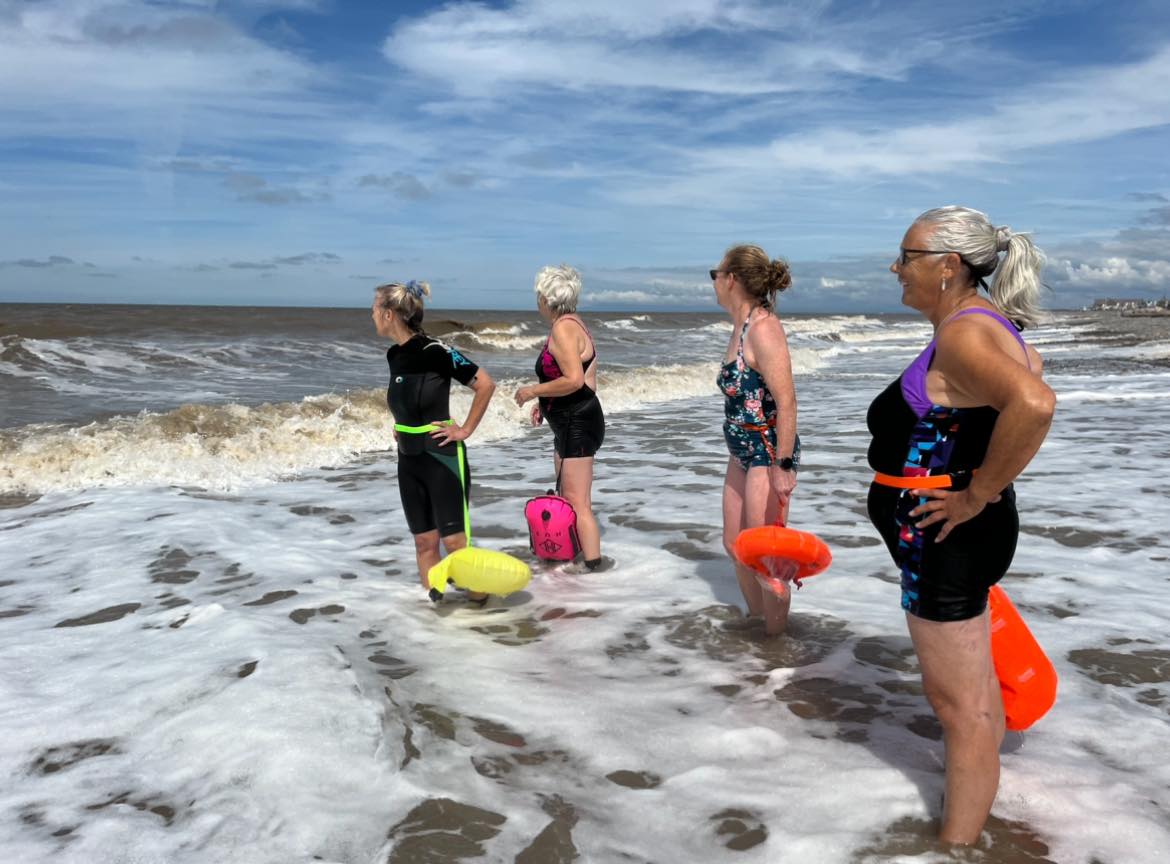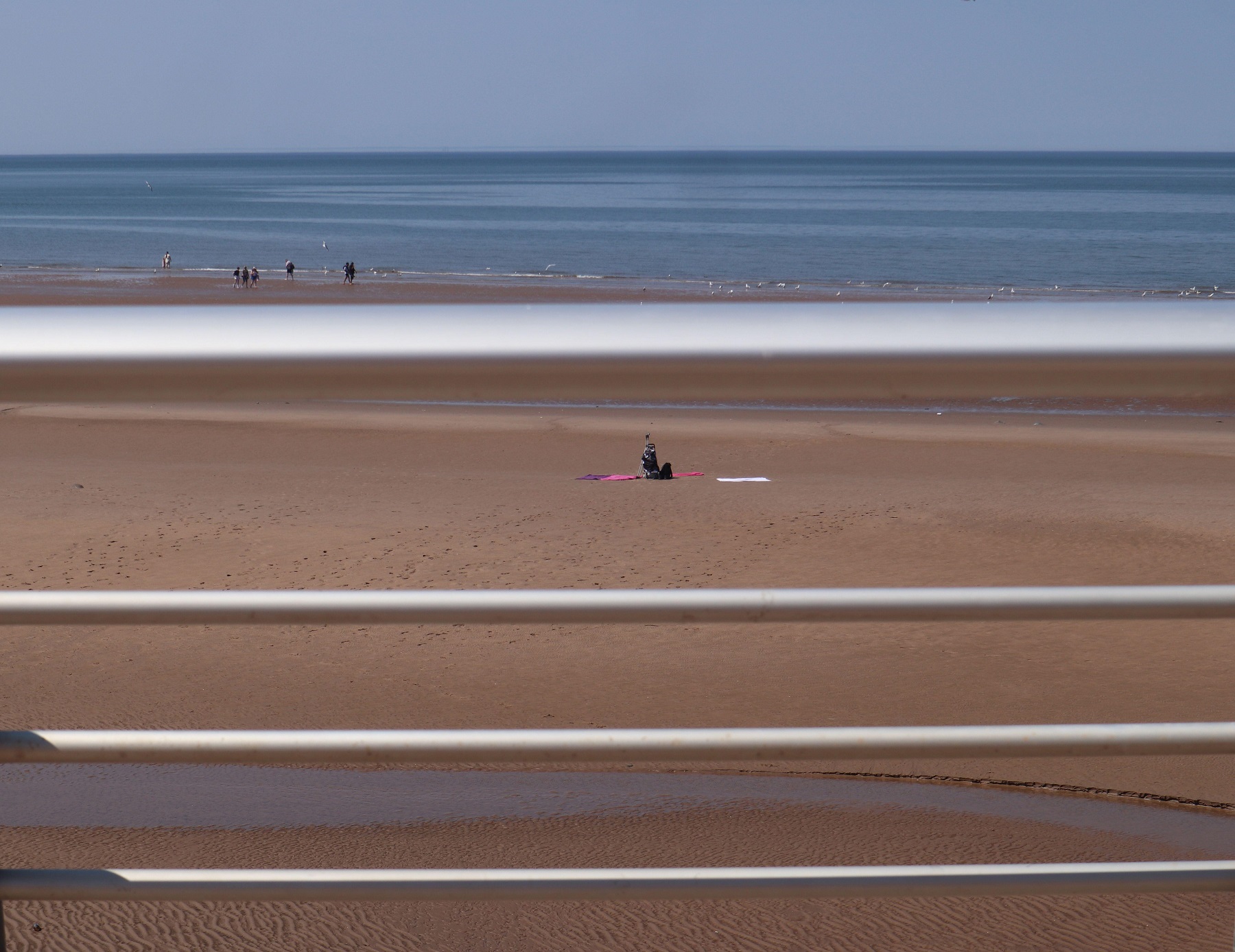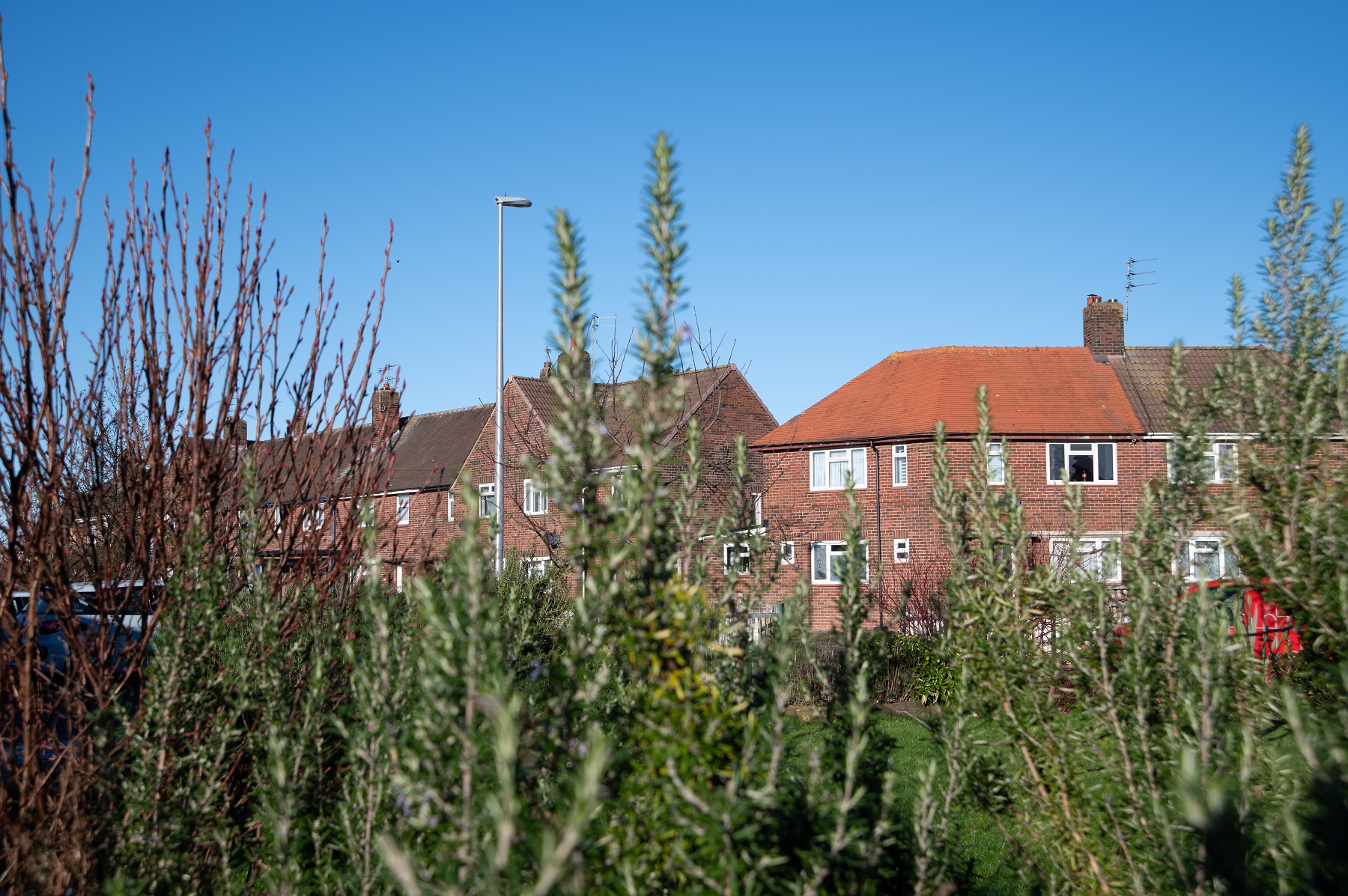Pristine beaches, poisoned water: Blackpool let down by water companies
Raw sewage was released into open water on the Fylde Coast more than 1,500 times in 2022. The result is Blackpool's hard-fought status as a safe place to swim is in jeopardy.
The Fylde Coast sea water was a bracing seven degrees on Tuesday, but retiree Chris Pogson donned her wetsuit and fluorescent green swimming cap and waded in at Fleetwood all the same.
Chris joined the Cleveleys Dippers in 2022. A group of likeminded women, many of them of a certain age, came together to reap the health and wellbeing benefits of sea bathing that Blackpool’s Tourism Industry was built on.
But Pogson wasn’t dipping on Tuesday. She was sampling the sea water to check for pollution.
“A lot of people have stopped dipping due to mistrust in the safety of our waters,” Pogson, who’s part of a citizen science project undertaken by local campaign group Fylde Coast Against Sewage (FCAW), told The Blackpool Lead.
“The Environment Agency only tests the water in what they deem to be the bathing season between May and October,” explained campaign chair Dr Barbara Kneale, who stood on the shore while Pogson retrieved the deep water sample. “But of course wild swimmers go out in all weathers and people paddle, people walk their dogs and people let their children play on the beach all year round. Let’s not forget the water comes onto the sand that we let our children dig in.”
While beaches here are well-maintained, for many residents there are mounting concerns over how safe the water is, following worrying statistics that showed raw sewage was released into open water on the Fylde Coast more than 1,500 times in 2022.
On Monday the government announced that over £180m of investment will be fast-tracked to prevent sewage spills, with United Utilities, who operate on the Fylde Coast, earmarked to receive £39m.
Work to prevent spills can’t come quickly enough for the Dippers, who were forced onto dry land last June after a pipe burst during a storm resulting in sewage, mixed with rainwater being released into the sea and temporary bathing restrictions being imposed.
When she found out about the sewage discharges, Dipper Michelina Sophia said she was shocked.
“Our beautiful sea is being pumped full of crap. Even on days it hasn't rained, if the forecast says it might, then there's a sewage discharge just in case the drains can't take the excess water.
“You can wake up on a Saturday morning knowing the tide and weather is perfect, only to find there'd been a sewage release at midnight. Then again two days later. You don't realise how regular and ongoing it is until you start to check,” said Sophia.
“Like many older women, I have health conditions and braving the cold sea along with the movement really helped. It helped my chronic fatigue, lessened pain and was great for my mental health. We are blessed to have this free and powerful force of nature on our doorstep as a remedy for all kinds of ills.
“From dipping twice a week, I've now not been for two months. We hardly even bother what the weather's like now – as long as there's no sewage, it feels safe.”
People from Blackpool take pride in the seafront - and with good reason. In 2016, a study commissioned by Royal Caribbean that looked at clarity of horizon, sea colour, cleanliness and other features concluded that Blackpool had the second best shoreline in the world. Blackpool South beach was awarded Blue Flag status in the same year.
EU environmental laws are credited with the improvement of the beaches where, in 1988, just six of 29 waters surveyed around Blackpool met bathing water guidelines. In 2014, all the town’s beaches passed the test.
While in 2019 the Environment Agency classified all Blackpool’s bathing water as good, in 2023 it was downgraded to sufficient for Blackpool Central and South – and insufficient for Blackpool North.
“I feel particularly aggrieved because I remember the sea being bad and then I remember it getting better with EU directives. Now I’m seeing it get bad again,” said Dr Kneale.
Mark Sandford, 58, who owns the New Chelvedon Hotel on Chapel Street believes unclean seas and bathing restrictions could have an impact on tourism and businesses like his that rely on it.
He told The Blackpool Lead: "The statistics are terrible. If the restrictions had carried on longer than they did in June it could have affected people coming to the town. When families come, they want to use the beach and they want it to be clean and not full of sewage.
"It is very important that the water is constantly clean. People may not necessarily stop coming altogether but they might not come as much. That’s bound to have a knock-on effect on every business that relies on tourism."
Ian Bell, 49, is a regular visitor to Blackpool, bringing his daughter to the town to enjoy the rides and swim in the water.
“I have suffered from eczema for 20 years and when I was in Mallorca the sea healed my skin along with the sunshine. We went on a family holiday to Blackpool and I thought I would go in the water, have some fun and encourage my daughter to swim. But when I got out I felt like I had been stung head to toe from jellyfish. It was quite intense.
“I heard that there had been a sewage overflow and thought, oh my god, I was swimming in that water then. It’s horrendous what’s going on. Where do these people who work in the water industry take their children? Do they not take their kids to the beach or for a trip out? Do they not tell their kids to go in the water?"
Resident Kelly Simons said she worries about the negative effects on people and animal's health.
"The sea is a slurry of sewage. United Utilities are discharging into the sea all through the year. It’s a health hazard for people and pets and god only knows what harm it’s doing to sea life."

Cleveleys Dippers by Jill Reidy
Storm overflows usually occur when the sewage system is at risk of being overwhelmed due to such circumstances as heavy rain, or high levels of groundwater.
In these cases, water companies may need to release excess water and sewage into rivers and the sea, to prevent it backing up and flooding streets and peoples homes. But charities and campaigners say storm overflows are being misused and their use underreported.
“…years of underinvestment by the water companies, poor enforcement by the Environment Agency and lack of funding by government…”
The Rivers Trust said it was particularly concerned by storm overflows being used during hot periods and that the challenges are compromising safety. They say water companies, the Environment Agency and the government all need to step up to resolve the issues.
"There are many challenges that our rivers and seas face, from physical modifications like concrete channels and barriers as well as discharges from sewage treatment works and agricultural land,” a spokesperson for the trust told The Blackpool Lead. “Periods of high rain can exacerbate problems when poorly managed livestock waste and fertilisers are washed off the land and overwhelmed sewerage networks spill untreated sewage into our waters.
“The Fylde Coast faced even worse abuse when a burst pipe spilled sewage and rainwater into the sea during a storm in June.
"After years of underinvestment by the water companies, poor enforcement by the Environment Agency and lack of funding by government, we need everyone to take responsibility for their piece of the puzzle; this is the only way we will see a real turn around in our natural world and the restoration of our rivers and seas to full health."
Figures from the Environment Agency (EA) show storm overflows were used 1,023 times within Fylde's local authority boundaries in 2022, discharging for a total of around 4,713 hours. In Wyre storm overflows were used 593 times in 2022, discharging for a total of around 2,240 hours.
They were used 52 times within Blackpool's local authority boundaries in 2022, discharging for a total of around 290 hours. All of these spills in Fylde, Wyre and Blackpool were from the United Utilities's network. These figures are not necessarily the full picture of the amount of water pollution in the area – Fylde, Wyre and Blackpool may also be impacted by overspills from areas it shares water sources with.
United Utilities claims that the spillage last June was due to a fracture on the pipe that sends the cleaned water from the Fleetwood Wastewater Treatment Works out to sea and it spilled treated clean water within the treatment works site – not sewage.

South Pier in Blackpool
For two weeks, while a bypass was built around the fracture until they replaced it, there was a higher risk storm overflows would operate more frequently along the Fylde Coast during heavy rainfall and United Utilities say the Environment Agency therefore issued precautionary advice not to swim at the beaches on the Fylde Coast for that period (11-19 June).
The Department for Environment, Food and Rural Affairs (DEFRA) said as well as sewage discharges, agriculture and infrastructure play a part.
A spokesperson for DEFRA told The Blackpool Lead: "The most significant impact on the bathing water is from the coastal storm sewage discharges resulting from rainfall on the Fylde Coast. There are also impacts from urban sources such as the sewage infrastructure along the Pier.
“Bathing water quality is also affected by a range of agricultural sources, including livestock farming in the Ribble catchment and saltmarsh grazing – although this has always been the case.
“Birds have been modelled as having an impact on bathing water quality at Blackpool North bathing water, from birds roosting under the pier and seabirds on or near the water. DNA analysis of bathing water samples has strengthened this," the department said, a claim Dr Kneale said she finds “bemusing”.
“Can seagulls really be blamed for polluting our seas when water companies are pumping human effluent into them?” she said.
DEFRA says United Utilities has invested more than £500 million in sewer improvements on the Fylde Coast since the early 1990s.

Blackpool seafront in 2023 - when water was declared unfit to swim in
A United Utilities spokesperson said: “The North West coastline has seen billions of pounds of investment over the last 30 years and we are now able to store and treat more wastewater than ever before.
“There will always be times during prolonged heavy rainfall when storm overflows still need to operate. However, thanks to recent schemes the impact of storm water has been dramatically reduced along the coast.
“Across the North West, we are proposing the largest ever programme of environmental improvements, and we will be spending around £3 billion up to 2030 to further reduce the impact of storm overflows. We’re also committed to working with other agencies to tackle all pollution sources.”
Councillor Jane Hugo, Blackpool Council Cabinet Member for Climate Change said the council is working in partnership with relevant bodies aiming to provide clean, safe water.
She said: “The spills at Blackpool and along the Fylde Coast have been well documented as have similar incidents across the country.
“We will continue to work with United Utilities, the Environment Agency and other partners to ensure that there are appropriate measures and investment in place to ensure that our coastline is protected and offers high-quality bathing waters.”
FCAS will present the first month’s findings of its water testing at Fleetwood to a council meeting at the end of the month. Fleetwood Town Council funded six month’s worth of testing kits for the group in a bid to build a bigger picture of water quality in our seas. The campaign group hopes to mirror this work in St Anne’s, as talks with Fylde Council are underway. A lack of response from Blackpool Council has been “disappointing”.
“I’m born and bred in Blackpool and I’m very proud of our beaches,” said Dr Kneale, who walks her dogs on them twice a day. “We should be able to be proud of what we have here and it should be pristine – as clean as it was in 2019.
“It’s an absolute disgrace that the water companies have been allowed to get away with it and hidden from us. For too long United Utilities’ priority has been its shareholders and not our seaside.”
You can see the previous newsletter we sent to our subscribers here
The Blackpool Lead is now on Substack.
Become a Member, and get our most groundbreaking content first. Become a Founder, and join the newsroom’s internal conversation - meet the writers, the editors and more.





